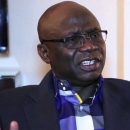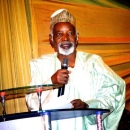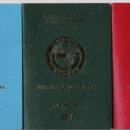Wainaina, one of Africa's leading literary figures, outs himself in response to wave of homophobic laws across continent
Read the full short story here
Binyavanga Wainaina, one of Africa's leading literary figures, has responded to a wave of recent anti-gay laws on the continent by publicly outing himself in a short story.
The Kenyan author and founder of the influential Nairobi-based literary journal Kwani said he would continue to travel to Nigeria, where gay and lesbian people face arrest and up to 14 years in prison under new legislation, and Uganda, where MPs have passed a bill imposing life sentences for homosexual acts.
"I'm a pan-Africanist; I belong to this continent," said Wainaina.
A regular visitor to Nigeria, where he said he had "lots of fun", the writer added that returning now would be an "adventure".
One of the most high-profile Africans to announce his sexuality, he published I Am a Homosexual, Mum, at the weekend to coincide with his 43rd birthday. Calling it the "lost chapter" of his 2011 memoir, it is a re-imagining of the last days of his mother's life, in which he goes to her deathbed and tells her the truth about his sexuality.
"Never, mum. I did not trust you, mum. And. I. Pulled air hard and balled it down into my navel, and let it out slow and firm, clean and without bumps out of my mouth, loud and clear over a shoulder, into her ear.
"I am a homosexual, mum."
The piece, which cuts back and forth between different ages, as well as real and imagined memories, confused some readers, prompting the author to tweet: "I am, for anybody confused or in doubt, a homosexual. Gay, and quite happy."
A documentary, featuring the writer discussing his revelation and issues around sex and identity in conversation with friends, was due to be released on Tuesday.
A host of Kenyan and other African media outlets have contacted him since the story was published but he has deferred interviews, he said, until the documentary is online.
"I have received thousands of messages from Africans all over the continent from diaspora Africans telling me: 'You have my support'," he said.
The timing of the move was not accidental, Wainaina admitted. Persecution of gay and lesbian people in Africa has been in the headlines since Nigeria passed new laws criminalising homosexuality and launched a wave of arrest.
Uganda's parliament in December passed a draconian law that called for life sentences for "aggravated homosexuality", which was vetoed by the president, Yoweri Museveni.
The winner of the Caine prize for African writing in 2002 and author of the widely-read satire How to Write About Africa in 2005, Wainaina returned to live in Kenya last year after a long absence, much of it spent in South Africa.
He has been conscious of his comparative freedom in artistic circles in Nairobi and contrasted it with that of a gay friend, in the city of Kisumu in western Kenya, who died last month.
The family of the deceased were thrown out of their church for trying to hold a memorial.
Their son –"because he had what hateful people call mannerisms" – was not safe to walk the streets, he said.
The writer said he had been mulling over coming out on Twitter, where he was listed among the world's top 100 Twitterati by the magazine Foreign Policy, but eventually decided to do so in a longer form.
His memoir, One Day I Will Write About This Place, which won a commercially powerful mention from Oprah Winfrey, shied away from any direct discussion of his sexual orientation.
Wainaina, director of the Chinua Achebe Centre for African Writers and Artists at Bard College, acknowledged that politicians in some countries were using popular prejudices to deflect attention from other issues.
"Homosexuality [in Africa] came out of the box a long time ago and it will be used by populists," he said.




